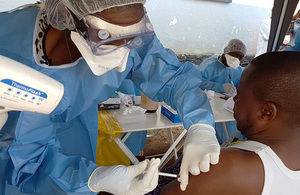Researchers find potential new gene therapy for blinding disease
Scientists funded by the National Eye Institute (NEI) report a novel gene therapy that halts vision loss in a canine model of a blinding condition called autosomal dominant retinitis pigmentosa (adRP). The strategy could one day be used to slow or...
NIH-led research team develops predictor for immunotherapy response in melanoma
In a new study, researchers developed a gene expression predictor that can indicate whether melanoma in a specific patient is likely to respond to treatment with immune checkpoint inhibitors, a novel type of immunotherapy. The predictor was developed...
Syria: WHO appeals for funding to sustain critical health care for millions trapped by conflict

A seven-year-old child stands in front of her damaged school in Idleb, Syria. October...
NIH begins clinical trial of live, attenuated Zika vaccine
Vaccinations have begun in a first-in-human trial of an experimental live, attenuated Zika virus vaccine developed by scientists at the National Institute of Allergy and Infectious Diseases (NIAID), part of the National Institutes of Health.
UK response to the Ebola outbreak in North Kivu, DRC

Image: WHO
Blood test may identify gestational diabetes risk in first trimester
A blood test conducted as early as the 10th week of pregnancy may help identify women at risk for gestational diabetes, a pregnancy-related condition that poses potentially serious health risks for mothers and infants, according to researchers at the...
That stinks! 1 in 15 Americans smell odors that aren’t there
Imagine the foul smell of an ash tray or burning hair. Now imagine if these kinds of smells were present in your life, but without a source. A new study finds that 1 in 15 Americans (or 6.5 percent) over the age of 40 experiences phantom odors. The...
NIH-funded researchers reverse congenital blindness in mice
Researchers funded by the National Eye Institute (NEI) have reversed congenital blindness in mice by changing supportive cells in the retina called Müller glia into rod photoreceptors. The findings advance efforts toward regenerative therapies for...
NIH study shows how MERS coronavirus evolves to infect different species
In the past 15 years, two outbreaks of severe respiratory disease were caused by coronaviruses transmitted from animals to humans. In 2003, SARS-CoV (severe acute respiratory syndrome coronavirus) spread from civets to infect more than 8,000 people,...
Cetuximab with radiation found to be inferior to standard treatment in HPV-positive oropharyngeal cancer
An interim analysis of data from a randomized clinical trial of patients with human papillomavirus (HPV)-positive oropharyngeal cancer found that treatment with radiation therapy and cetuximab is associated with worse overall and progression-free...







